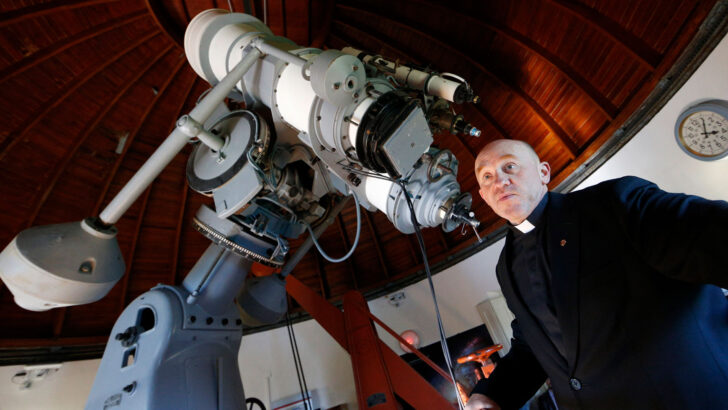Priests have been more in the news of late, thanks to that ‘Last Priests’ programme reviewed last week.
Yet again we got another fine example of a priest in action on Mornings with Wendy (Spirit Radio, Friday) when Rob Clarke interviewed Fr Gabriel Dolan – a Kiltegan missionary in Kenya for the past 40 years. He had just been awarded the Presidential Distinguished Service Award for his human rights work in Peace, Reconciliation and Development.
He spoke of being awed by the remoteness of where he was posted in Kenya when he went first. He worked a lot in the area of land – protecting land rights, helping the poor to avoid eviction, empowering the locals to use judicial processes to defend themselves. He was inspired by the people and by the Gospel, sowing seeds for the future. Asked about the state of the Church in Kenya he said it was a young and lay-led church.
Another priest Fr Eamonn McCarthy presented a new show Science, Religion and the Modern World (Radio Maria, Wednesday). This is really timely, an antidote to that lazy assumption that science and religion are in conflict with each other. This show explores the relationship and complementarity of faith and science.
Special guest Michael Flanagan from Derry has a background in engineering and physics. He came from a religious family but had a strong interest in science and sought to reconcile the two. Too often, he thought, young people opt for one or the other, and the world seen only through the lens of science can be a cold place.
He was obviously an enthusiast for both faith and science – he described himself as “blown away” by what the scientific method has achieved. In the Western World he thought there was too much materialism.
Historically he thought an intellectual elite had become drunk with pride in their own ability, thus taking us away from God. All they could see was the material world, with love and beauty reduced to a chemical reaction. Yet so many scientists and medical people, even some Nobel Prize winners, were religious believers – a majority in the USA, he said.
He referenced miracles, with Fr McCarthy referencing the 67 proven miracles from Lourdes that had undergone rigorous scientific investigation. The priest-presenter also spoke of people being brought to the edge of science, where there could be or needed to be a ‘leap of faith’.
Those who regularly urge us to ‘follow the science’ are quite willing to abandon it when it suits them – especially on the issue of abortion. What’s obviously a human life magically morphs into some mysterious entity that doesn’t attract any human rights.
On Newstalk Breakfast (Thursday) Labour Leader Ivana Bacik was speaking about her party’s ‘Reproductive Health Related Leave Bill’ when she gave the game away: “pregnancy is not sickness”. I heard a penny dropping and I hope Ms Bacik did.
So, if it’s not sickness, or an illness, why is so much Department of Health money being spent on it? Not to enhance the health of mother and baby when sometimes sickness becomes an issue, but to end the very life of the baby – €46 million spent since abortion was legalised. And yet some who are really ill struggle to get treatment.
We have so many such contradictions, ironies, even hypocrisies in our approach to public policy. We pass a children rights referendum, then another to take away their right to be born; we have well regarded campaigns against suicide, then at the same time assisted suicide is promoted; we have a drug driving problem and seek to decriminalise drugs, thus making them more readily available and therefore used more often. We have a notorious drink problem, and yet the Government is planning longer opening hours for pubs.
This issue was discussed on Today with Claire Byrne (RTE Radio 1, Thursday) with Dr Sheila Gilheany, CEO of Alcohol Action Ireland and Patrick Costello, Green Party TD and member of the Oireachtas Justice Committee.
I thought Ms Gilheany made sense, with her ‘wealth of evidence’ showing a strong link between extended opening hours and increased alcohol related harms including road deaths and assaults, especially in rural areas. I wasn’t impressed by Deputy Costello’s defence of the plans. Asked for the benefits, he said that it would improve the “night time economy” and that the night club and disc jockey sector wanted it.
Not exactly a slam dunk.
PICK OF THE WEEK
SONGS OF PRAISE
BBC One Sunday January 28 1.15 pm
Pam Rhodes marks International Holocaust Memorial Day and explores stories of when hope and refuge were offered by Christians to Jews fleeing the Nazis in one of the darkest chapters of human history.
BROTHERHOOD: THE INNER LIFE OF MONKS
BBC Four Monday (night) January 29 12.25 am
At a time of change, a community of ageing monks reflect on their spirituality as the number of burials in the monastery graveyard continues to grow (R).
FÍORSCÉAL
TG 4 Thursday February 1 10.30 pm
Exploring how social media influencers share details of their children’s lives, with parents monetising their daily life, their struggles and their private moments.


 Brendan O’Regan
Brendan O’Regan Jesuit Fr Gabriele Gionti, an astronomer, shows off Vatican observatory’s Zeiss telescope. The relationship between faith and science has been highlighted on a new Radio Maria show. Photo: CNS.
Jesuit Fr Gabriele Gionti, an astronomer, shows off Vatican observatory’s Zeiss telescope. The relationship between faith and science has been highlighted on a new Radio Maria show. Photo: CNS. 